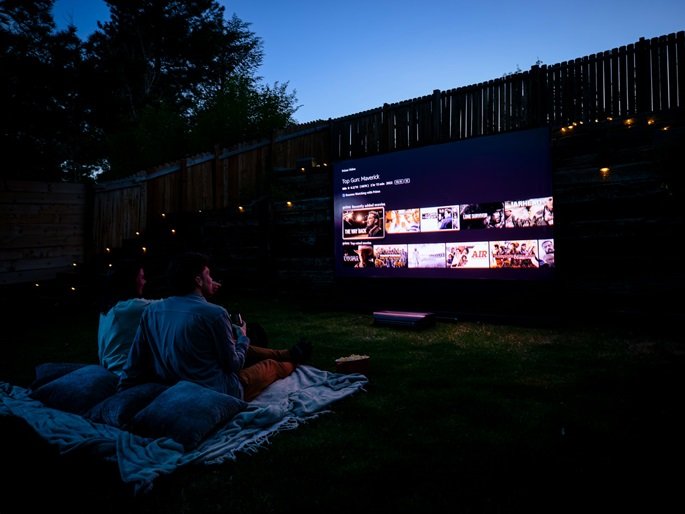Whether one wants to mount a splendid home theater system or establish a commercial presentation your projector screen is the ultimate ideal solution for attaining these objectives. A good screen pays close attention to the quality of the image, the comfort that a particular screen provides, and the efficiency of the projector. Although there are several solutions available choosing the right one can be confusing. In this guide, we’ll help you weigh the important aspects that might interest you so you can know what to look out for.
Key Takeaways:
- Purpose Matters: Determine the function you are going to primarily use the projector screen for in order to eliminate the choice.
- Room Environment: Also think about the dimensions of the room where the screen is going to be used and amount of light that falls on the given area and the distribution of light in the given room.
- Screen Type: Depending on the type of setup you want to use you can opt for a fixed-frame screen, pull-down, motorized, or portable screen.
- Material Quality: All of this can mean image quality, thus, what to look for in regards to screen material includes gain, viewing angle, or texture.
- Aspect Ratio and Size: To get the best results, the screen size should correspond with the projector and the size of the room as well.
- Budget: Stick to a realistic budget but it is also a good idea to try and get as much quality and features in for as little money as possible.
- Pro Tip: Before buying, check for XGIMI promo codes to ensure you get the best price.

Considerations to Make When Buying a Projector Screen
1. Purpose and Application
However, the most important of them is the intended use of the projector screen. Is it for home theatre, office demonstration, or even for those outdoors, movies under the stars? Every type of use case may need a different type of screen. For instance:
- Home theaters benefit from high-quality fixed-frame or motorized screens.
- Some business presentations demand portable or pull-down screens because of the dynamic nature of the presentations.
- Outdoor-related events require screens that can withstand various weather conditions.
2. Room Size and Layout
Proportionality and size of the room dictate the choice of a screen. Another key factor that must be measured so that the best screen size can be determined includes the distance from the projector to the screen and the seating arrangement. Make sure that the screen is neither too large for the wall nor ceiling space so that it doesn’t dominate the room.
3. Ambient Lighting Conditions
The lighting plays a huge role in how clear and detailed/fresh the image is to the viewer. For such lights, a white screen is adequate for controlled rooms. For areas that have much natural light, use a gray or ALR type of screen to preserve the image quality.
4. Screen Type
Projector screens come in various types, each with unique advantages:
- Fixed-Frame Screens: Provides clearer and sharper images which makes them better for permanent mounted equipment.
- Pull-Down Screens: Broad and not very expensive but could crease and possibly look old after some time.
- Motorized Screens: Category 2 can be described as convenient, and stylish, but more expensive.
- Portable Screens: Easy to carry and very convenient, especially for outdoor and mobile applications.

A projector screen in a classroom
5. Material and Gain
The result also shows that the material used on the screen has an impact on the viewing experience. Key considerations include:
- Gain: A high gain means more light is reflected to increase brightness, however, the viewing angle becomes very limited.
- Texture: High-definition screens must be smooth for 4K or higher to avoid contamination of high-definition images.
- Durability: Search for products that can repel dust, scratch-proof, and are relatively wear-proof.
6. Aspect Ratio and Size
The aspect ratio should ideally be that of your projector to give you the right resolution as you view the screen. Common ratios include:
- 16:9: Recommended for High Definition Televisions and most home entertainment systems.
- 4:3: Suitable for presentations and other older content which have not been made in Canvas.
- 2.35:1: Ideal for viewing large-screen cinematic movies.
There is also an opportunity to choose a screen diagonal that will be most optimal for complete immersion while maintaining the possibility of comfortable use in everyday life. One guideline is to choose a screen that is one-third the distance measured from the screen to the nearest seat.
7. Installation and Maintenance
It is also wise to look at the installation requisites of the screen. This type requires the screen to be fixed on the wall, but pull-down and motorized types may be fixed on the ceiling. While portable screens need little installation, some may assume extra auxiliary tools for security when moving from one place to another.
Another factor that contributes to the decision is maintenance. Choose screens that are most probably to be clean and can stay longer without being changed or repaired for quick performance.
8. Budget and Value
Choose a budget that will suit your needs. Although it can be easy to always look at the price and opt for the lowest price range, this is a good area where spending more will pay off in the long run when you think about the benefits of a quality screen. Choose manufacturers that give a strong warranty and good customer service service.
Selecting a projector screen is therefore a function of your needs, the condition of the room, and your pocket. If you consider these factors, you will be able to make an intelligent choice and come up with an enjoyable show that will provide you with the experience you need. No matter if you are sitting in a theater enjoying your movie show, a video game, or working at your office, you want the best for your projector screens.

